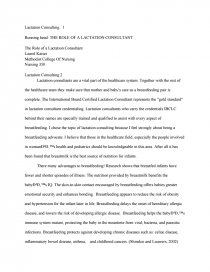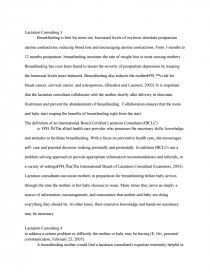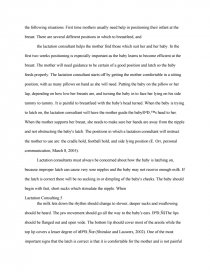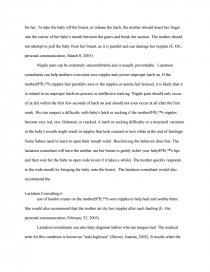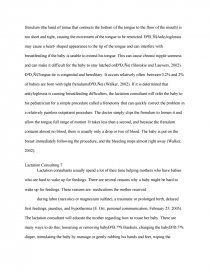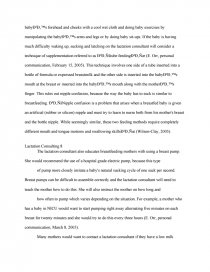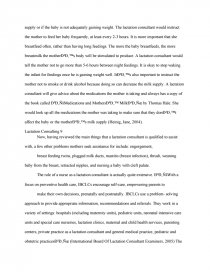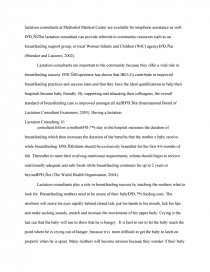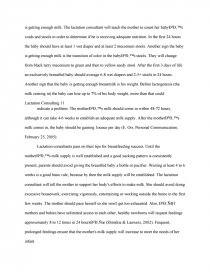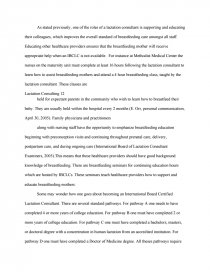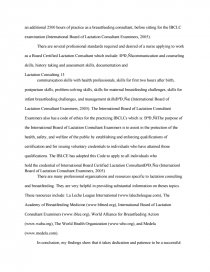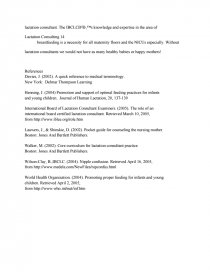Lactation Consulting
Essay by review • February 6, 2011 • Research Paper • 3,557 Words (15 Pages) • 2,362 Views
Lactation Consulting 1
Running head: THE ROLE OF A LACTATION CONSULTANT
The Role of a Lactation Consultant
Laurel Kaiser
Methodist College Of Nursing
Nursing 350
Lactation Consulting 2
Lactation consultants are a vital part of the healthcare system. Together with the rest of the healthcare team they make sure that mother and baby's care as a breastfeeding pair is complete. The International Board Certified Lactation Consultant represents the "gold standard" in lactation consultant credentialing. Lactation consultants who carry the credentials IBCLC behind their names are specially trained and qualified to assist with every aspect of breastfeeding. I chose the topic of lactation consulting because I feel strongly about being a breastfeeding advocate. I believe that those in the healthcare field, especially the people involved in woman’s health and pediatrics should be knowledgeable in this area. After all it has been found that breastmilk is the best source of nutrition for infants.
There many advantages to breastfeeding! Research shows that breastfed infants have fewer and shorter episodes of illness. The nutrition provided by breastmilk benefits the baby’s IQ. The skin-to-skin contact encouraged by breastfeeding offers babies greater emotional security and enhances bonding. Breastfeeding appears to reduce the risk of obesity and hypertension for the infant later in life. Breastfeeding delays the onset of hereditary allergic disease, and lowers the risk of developing allergic disease. Breastfeeding helps the baby’s immune system mature, protecting the baby in the meantime from viral, bacteria, and parasitic infections. Breastfeeding protects against developing chronic diseases such as: celiac disease, inflammatory bowel disease, asthma, and childhood cancers. (Shinskie and Lauwers, 2002)
Lactation Consulting 3
Breastfeeding is best for mom too. Increased levels of oxytocin stimulate postpartum uterine contractions, reducing blood loss and encouraging uterine contractions. From 3 months to 12 months postpartum, breastfeeding increases the rate of weight loss in most nursing mothers. Breastfeeding has even been found to lessen the severity of postpartum depression by keeping the hormonal levels more balanced. Breastfeeding also reduces the mother’s risk for breast cancer, cervical cancer, and osteoporosis, (Shinskie and Lauwers, 2002). It is important that the lactation consultant collaborate with the mother shortly after delivery to eliminate frustration and prevent the abandonment of breastfeeding. Collaboration ensures that the mom and baby start reaping the benefits of breastfeeding right from the start.
The definition of an International Board Certified Lactation Consultant (IBCLC)
is: “The allied health care provider who possesses the necessary skills, knowledge, and attitudes to facilitate breastfeeding. With a focus on preventive health care, she encourages self- care and parental decision- making prenatally and postnatally. In addition IBCLCs use a problem solving approach to provide appropriate information recommendations and referrals, in a variety of settings”(The International Board of Lactation Consultant Examiners, 2005). Lactation consultants can assist mothers in preparation for breastfeeding before baby arrives through the time the mother or her baby chooses to wean. Many times they serve as simply a source of information, encouragement, and reassurance that mother and baby are doing everything they should be. At other times, their extensive knowledge and hands-on assistance may be necessary
Lactation Consulting 4
to address a certain problem or difficulty the mother or baby may be having (E. Orr, personal communication, February 25, 2005).
A breastfeeding mother would find a lactation consultant's expertise extremely helpful in the following situations. First time mothers usually need help in positioning their infant at the breast. There are several different positions in which to breastfeed, and
the lactation consultant helps the mother find those which suit her and her baby. In the first two weeks positioning is especially important as the baby learns to become efficient at the breast. The mother will need guidance to be certain of a good position and latch so the baby feeds properly. The lactation consultant starts off by getting the mother comfortable in a sitting position, with as many pillows on hand as she will need. Putting the baby on the pillow or her lap, depending on how low her breasts are, and turning the baby in to face her lying on his side tummy to tummy. It is painful to breastfeed with the baby's head turned. When the baby is trying to latch on, the lactation consultant will have the mother guide the baby’s head to her. When the mother supports her breast, she needs to make sure her hands are away from the nipple and not obstructing the baby's latch. The positions in which a lactation consultant will instruct the mother to use are: the cradle hold, football hold, and side lying position (E. Orr, personal communication, March 8, 2005).
Lactation consultants must always be concerned about how the baby is latching on, because improper latch can cause very sore nipples and the baby may not receive enough milk. If the latch is correct there will be no sucking in or dimpling of the baby's cheeks. The baby should begin with fast, short sucks which stimulate the nipple. When
Lactation Consulting 5
the milk lets down the rhythm should change to slower, deeper sucks and swallowing should be heard. The jaw movement should go all the way to the baby's ears. “The lips should be flanged out and open wide. The bottom lip should cover most of the areola while the top lip covers a lesser degree of it” (Shinskie and Lauwers, 2002). One of the most important signs that the latch is correct is that it is comfortable for the mother and is not painful for her. To take the baby off the breast, or release the latch, the mother should insert her finger into the corner of her baby's mouth between the gums and break the suction. The mother should not attempt to pull the baby from her breast, as it is painful and can damage her nipples (E. Orr, personal communication, March 8, 2005).
Nipple pain can be extremely uncomfortable and is usually preventable. Lactation
...
...
